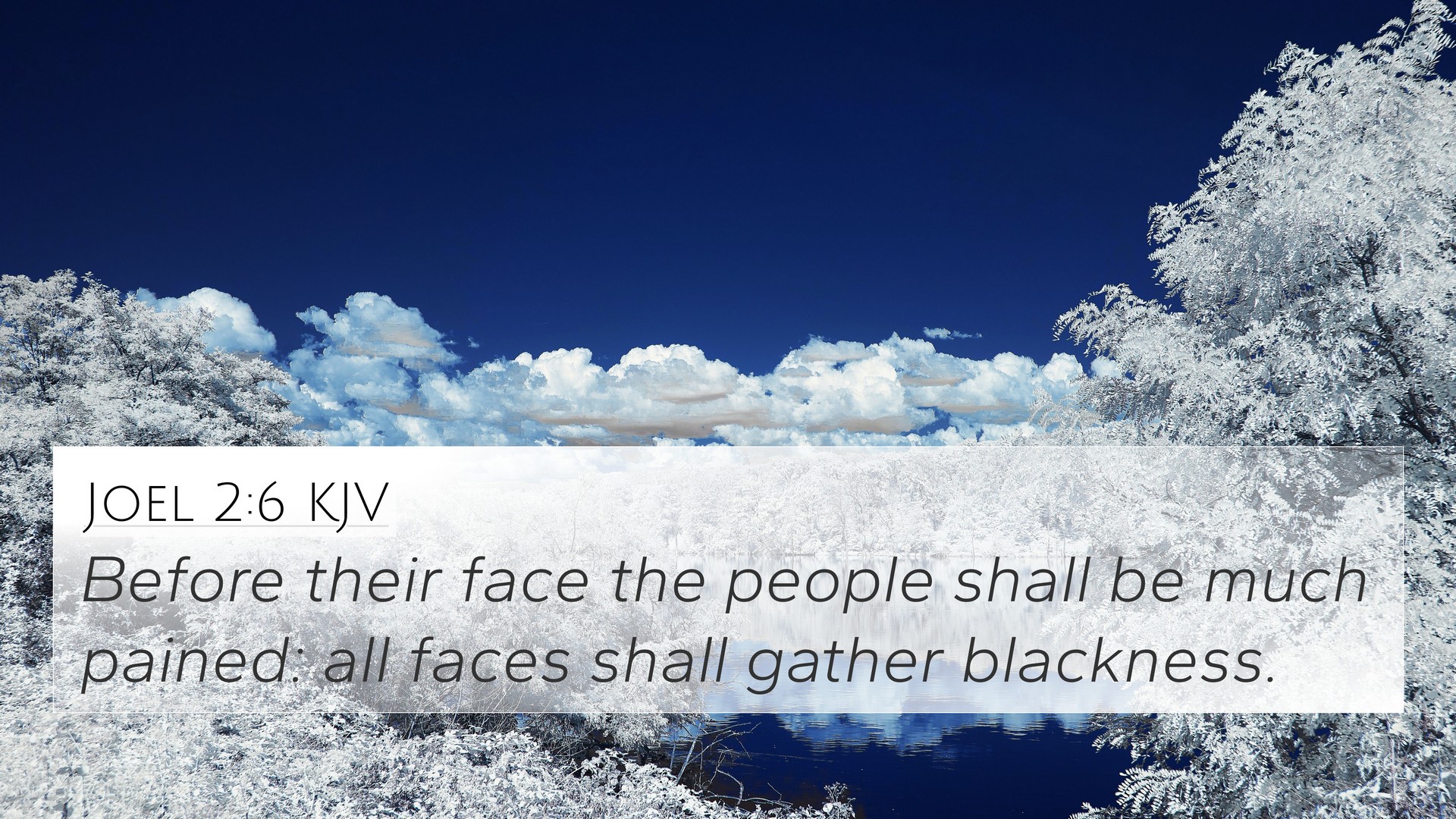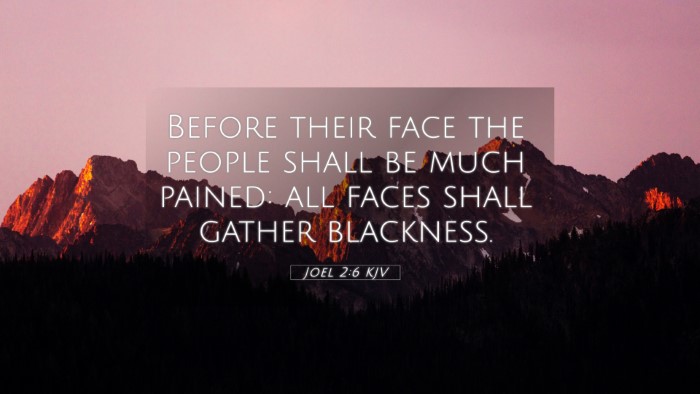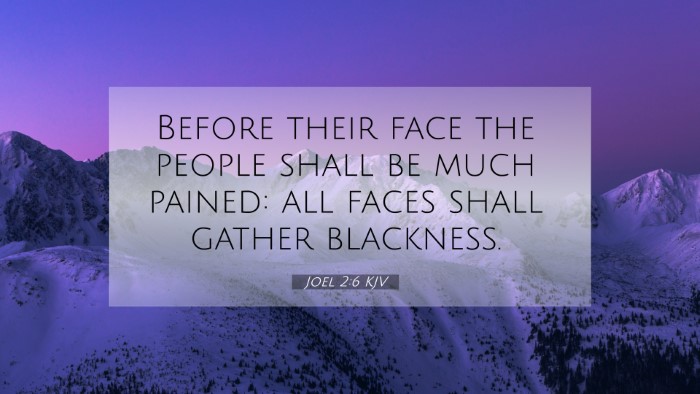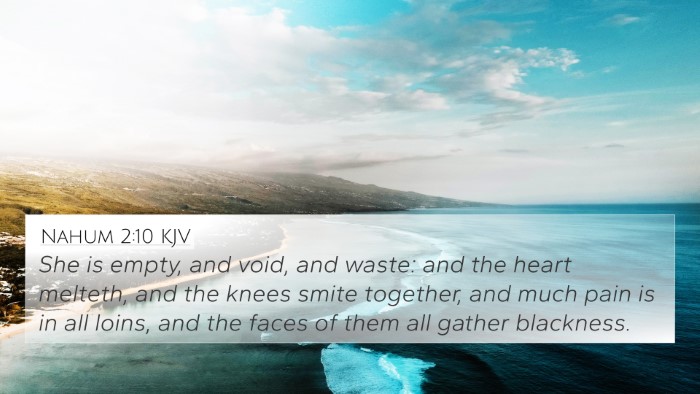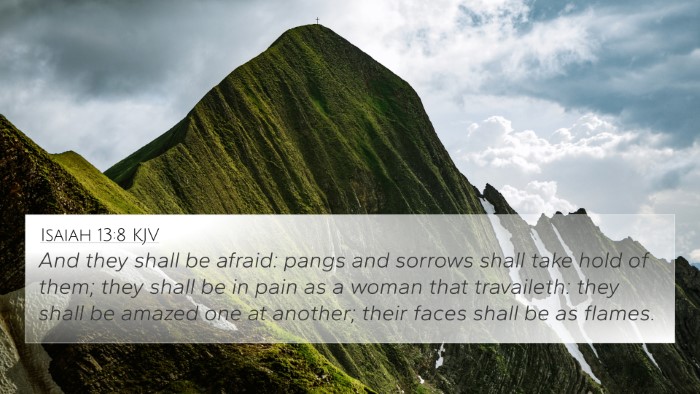Understanding Joel 2:6
Joel 2:6 states, "Before them the people shall be much pained: all faces shall gather blackness." This verse is a part of the larger prophetic vision where Joel describes the imminent day of the Lord as a time of overwhelming fear and distress among the people.
Contextual Background
The Book of Joel, a prophetic text in the Old Testament, addresses the people of Israel and highlights themes of repentance, divine judgment, and restoration. Joel serves as a warning of impending calamity, urging the Israelites to turn back to God in faith and humility.
Interpretations from Public Domain Commentaries
-
Matthew Henry:
Matthew Henry emphasizes the physical and emotional agony that will seize the people in response to God’s judgment. He remarks that their faces reflecting a sense of impending doom signify the universal panic that will accompany the arrival of God's righteous retribution.
-
Albert Barnes:
Albert Barnes notes the imagery of the people’s faces gathering blackness, which he interprets as their reaction to the terror brought forth by God’s actions. This description illustrates sorrow and despair, reflecting the seriousness of the situation and the consequences of estrangement from God.
-
Adam Clarke:
Adam Clarke points out that the phrase “much pained” indicates intense suffering, both physically and spiritually. He suggests that the prophet’s intention is to awaken Israel from complacency, making them acutely aware of the severity of their circumstances and the need for repentance.
Thematic Connections and Cross-References
Joel 2:6 can be connected to several other biblical passages that highlight themes of divine judgment and human response.
- Isaiah 13:6-8: Refers to the day of the Lord involving great terror, where people are in anguish.
- Ezekiel 30:3: Speaks of a day of judgment that will bring distress upon nations.
- Amos 5:18-20: Discusses the fear surrounding the day of the Lord, suggesting it is not a day of light but of dread.
- Malachi 4:1: Prophesies destruction for the wicked and the fear that it will instill.
- Luke 21:25-26: New Testament echoes of distress among nations, highlighting eschatological themes.
- Matthew 24:30: Describes the reaction of the earth's inhabitants to the coming of the Son of Man.
- Revelation 6:15-17: Illustrates the terror of people facing divine judgment in the end times.
The Importance of Repentance
Joel’s message encourages us to reflect upon our own lives and the collective state of humanity. The dread and blackness that the people experience are not just feelings of despair but symbolize the consequence of a life distanced from God’s ways.
Application of Joel 2:6 Today
In contemporary settings, this verse still resonates, warning against complacency and urging reflection on one’s spiritual state. It invites individuals and communities to recognize the weight of sin and the need for reconciliation with God.
Conclusion
Understanding Joel 2:6 through a variety of lenses from esteemed commentaries enhances our grasp of its significance. The emotional weight carried by this verse aligns with many biblical themes regarding judgment, repentance, and the overarching narrative of redemption. Such connections can greatly enrich Bible studies and sermon preparations, encouraging deeper engagement with scripture.
For Further Study
For individuals seeking to engage deeply with the biblical text, utilizing tools for Bible cross-referencing can illuminate connections and enhance understanding. Consider exploring:
- Bible concordance for finding related verses.
- Bible cross-reference guides for thematic studies.
- Cross-reference Bible study methods to deepen comprehension.
- Bible reference resources that assist in connecting verses.
- Comprehensive Bible cross-reference materials for extensive study.
In the pursuit of thematic Bible verse connections and deeper scriptural dialogues, Joel 2:6 remains a profound verse highlighting the human condition in the face of divine actions. Engaging with its meaning helps unravel the rich tapestry of God's Word.
